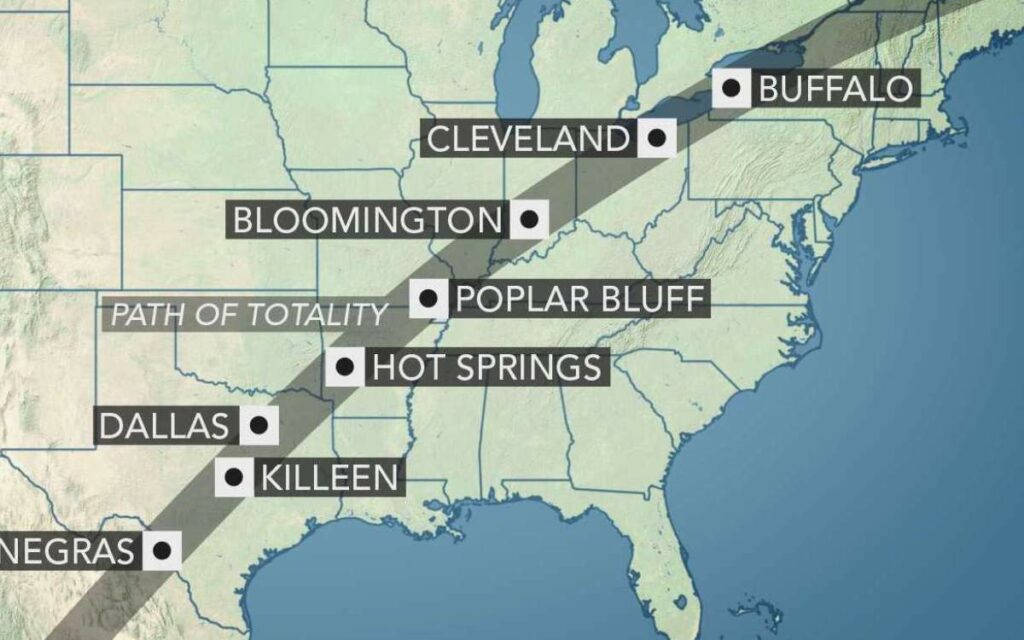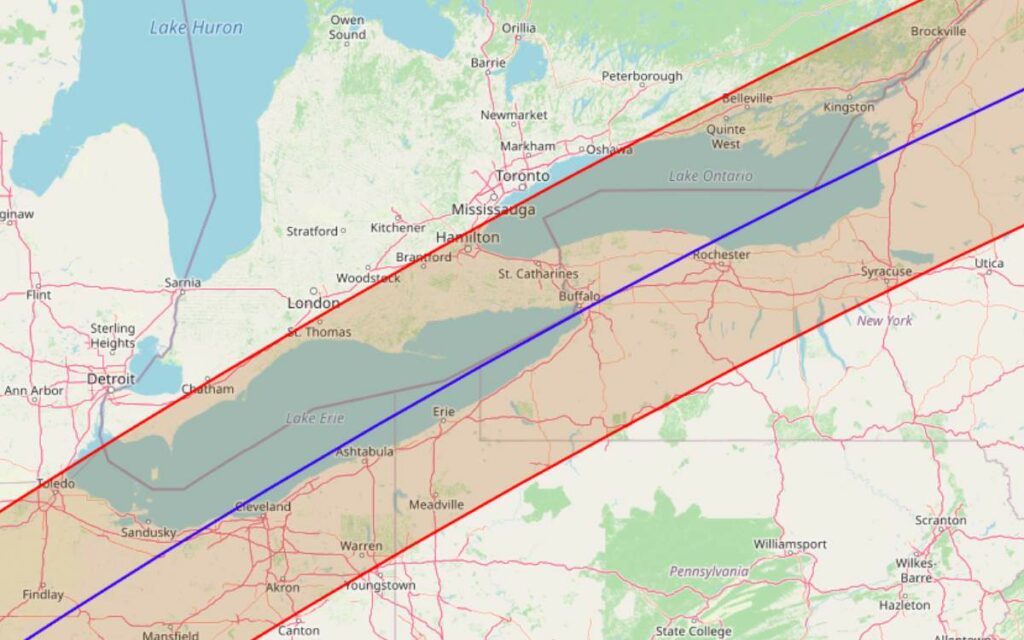
It will be two decades before Canada sees another total solar eclipse, and no less than 82 years before Ontario experiences the phenomenon again. Multiple reasons, including the lengthy duration of totality on the peninsula, will likely coalesce to attract countless spectators to Niagara. Photo credit: AccuWeather/McKinley Museum
In almost exactly one year’s time, the Niagara Peninsula will sit dead-center of a rare total solar eclipse set to track across North America on April 8, 2024.
The astronomical phenomenon’s near 200km-wide path of totality – which will see the moon pass between Earth and the sun, completely blotting out the sun’s light for a narrow band of viewers – is slated to arc across the continent from Mexico in the southwest through to Newfoundland in the northeast, cutting past 13 U.S. states and six Canadian provinces.
Dubbed the “Great North American Eclipse”, it will be the first total solar eclipse to be visible in Canada since 1979 and will be the only solar eclipse of the 21st century in which totality is visible in Mexico, the U.S., and Canada.
Depending on weather, Niagara could well end up being one of the best and most popular spots in the entire country to view the spectacle, given its position as an existing tourist destination, proximity to major urban centres outside the path of totality, including virtually the entire GTA, and duration of totality, which decreases both from west to east and with deviation from the path’s centreline.
Fort Erie, which lies closest of anywhere in the region to the middle of the moon’s calculated path, will see approximately three minutes 45 seconds of total darkness – one of the longest windows in Canada.

The 2024 solar eclipse’s path of totality over southern Ontario (shaded red area). The blue line represents the moon’s projected course, the closer to the line, the longer the duration of totality. Thus, Fort Erie will experience a long period of darkness, whereas places on the edge like Hamilton will have less than two minutes of total blackness. Photo credit: eclipse2024.org
Considering Niagara’s prime location, and the fact that the total solar eclipse that swept across the centre of the U.S. in August 2017 drew tens of millions of live observers and spawned hundreds of unique viewing events, one local resident is telling officials to be prepared.
In a presentation to Pelham town council last week, Fenwick resident Wayne Liebau said that while “brief”, the event has the potential to be “hugely popular”.
“People will travel – sometimes great distances – to see a total eclipse. That afternoon, millions of people will travel to be in the path of totality,” Liebau, a farmer by trade, told councillors last Wednesday.
“Some will come just for the day’s event. Others will plan vacations around it.”
As Liebau explained, during the 2017 eclipse that crossed the U.S., some parts of the country were “jammed beyond anything locals had ever seen.”
“Even with advance planning, many areas saw groceries, fuel and general supplies run low. Johnnie-on-the-Spot rentals were sold out years before.”
According to Liebau, while local municipal governments need to be prepared in terms of traffic regulation, emergency services and the like, the event represents a significant opportunity for accommodations, businesses, tourist operators, and educational institutions.
“Positive aspects range from relatively mundane commercial prospects to once-in-a-lifetime opportunities in the cultural and educational fields,” said Liebau.
“Though weather conditions will have an influence on numbers, Niagara will be crowded. Supplies of many types may be stretched. Traffic will likely be a nightmare. Preparedness can ensure that challenges don’t diminish a wonderful event.”
The moment of totality – wherein the moon will fully cover the face of the sun and the skies will go completely dark – is set to commence across Niagara between roughly 3:18-3:20pm on April 8, 2024.
To learn more about the “Great North American Eclipse” click here.




















